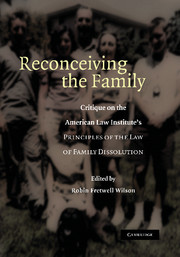 Reconceiving the Family
Reconceiving the Family Book contents
- Frontmatter
- Contents
- Acknowledgments
- Foreword, by Mary Ann Glendon
- List of Contributors
- Introduction
- PART ONE FAULT
- PART TWO CUSTODY
- PART THREE CHILD SUPPORT
- PART FOUR PROPERTY DIVISION
- 8 The ALI Property Division Principles: A Model of Radical Paternalism?
- 9 Unprincipled Family Dissolution: The ALI's Recommendations for Division of Property
- 10 You and Me against the World: Marriage and Divorce from Creditors' Perspective
- PART FIVE SPOUSAL SUPPORT
- PART SIX DOMESTIC PARTNERSHIP
- PART SEVEN AGREEMENTS
- PART EIGHT JUDICIAL AND LEGISLATIVE PERSPECTIVES
- PART NINE INTERNATIONAL REFLECTIONS
- Afterword: Elite Principles: The ALI Proposals and the Politics of Law Reform, by Carl E. Schneider
- Index
9 - Unprincipled Family Dissolution: The ALI's Recommendations for Division of Property
Published online by Cambridge University Press: 25 January 2010
- Frontmatter
- Contents
- Acknowledgments
- Foreword, by Mary Ann Glendon
- List of Contributors
- Introduction
- PART ONE FAULT
- PART TWO CUSTODY
- PART THREE CHILD SUPPORT
- PART FOUR PROPERTY DIVISION
- 8 The ALI Property Division Principles: A Model of Radical Paternalism?
- 9 Unprincipled Family Dissolution: The ALI's Recommendations for Division of Property
- 10 You and Me against the World: Marriage and Divorce from Creditors' Perspective
- PART FIVE SPOUSAL SUPPORT
- PART SIX DOMESTIC PARTNERSHIP
- PART SEVEN AGREEMENTS
- PART EIGHT JUDICIAL AND LEGISLATIVE PERSPECTIVES
- PART NINE INTERNATIONAL REFLECTIONS
- Afterword: Elite Principles: The ALI Proposals and the Politics of Law Reform, by Carl E. Schneider
- Index
Summary
The Principles reflect eleven years of work by a massive team of drafters, advisors, and consultative groups. A former director of the ALI described the project as “among the most important that the [ALI] has ever undertaken.” The task took on Herculean dimensions. Unfortunately, the final result is profoundly disappointing, particularly in contrast to the ALI's outstanding work in the Restatements, which have often exerted a strong positive influence on major areas of law.
The Principles, published with the prestigious imprimatur of the ALI, may impede much needed reforms and even lead the legislators, judges, and rule makers to whom they are addressed to adopt unsound policies. In seeking to ward off these potentially harmful effects, this chapter first analyzes exactly what the ALI's imprimatur on the Principles really means and then demonstrates why their uncritical acceptance as guideposts would be unwise. The Principles contain serious deficiencies that should be corrected.
At the outset, it is crucial to examine the procedures under which the Principles were passed. Although ALI's bylaws require authorization by the membership and approval by the ALI for publication of any work intended to represent the ALI's position, the bylaws also provide that “[a] quorum for any session of a meeting of the members is established by registration during the meeting of 400 members… .” Thus, a quorum is conclusively deemed to be present for all sessions of a meeting as soon as a little over 10 percent of the approximately 3,800 members have registered, even though the number present and voting at a given session may be minimal.
- Type
- Chapter
- Information
- Reconceiving the FamilyCritique on the American Law Institute's Principles of the Law of Family Dissolution, pp. 176 - 194Publisher: Cambridge University PressPrint publication year: 2006
- 1
- Cited by


